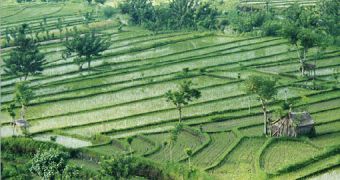According to a new research whose findings were only recently made public in the online edition of Nature Climate Change, rice crops worldwide must be held responsible for upping the atmospheric concentrations of greenhouse gas methane.
To cut a long story short, they must be regarded as a major contributor to ongoing phenomena such as climate change and global warming.
Interestingly enough, rice agriculture is getting ever less environmentally friendly because of increased CO2 atmospheric concentrations.
As the researchers who have looked into this issue explain, rice crops produce more CH4 as a result of rising temperatures, meaning that they are in fact responding to the ever more poignant effects of global warming.
Apparently, the researchers who conducted this study based their conclusions on data collected whilst analyzing rice paddies in Asia and North America. The Alpha Galileo Foundation quotes Dr. Kees Jan van Groenigen, presently working with the Botany Department at the School of Natural Science, Trinity College Dublin, who made a case of how, “Our results show that rice agriculture becomes less climate friendly as our atmosphere continues to change.”
Furthermore, “This is important because rice paddies [i.e. irrigated fields where rice is grown] are one of the largest human sources of methane, and rice is the world's second-most produced staple crop [i.e. a crop which can be stored for use throughout the entire year].”
Should their estimates be accurate, it is quite likely that, by the end of this century, rice crops will witness a doubling of the CH4 they produce for each kilogram of rice harvested by workers.
For the time being, concerns are raised with respect to how the predicted population growth will impact on rice harvests and their being a contributor to climate change.
“Because global demand for rice will increase further with a growing world population, our results suggest that without additional measures, the total CH4 emissions from rice agriculture will strongly increase,” Professor Chris van Kessel of the University of California in Davis says.

 14 DAY TRIAL //
14 DAY TRIAL //